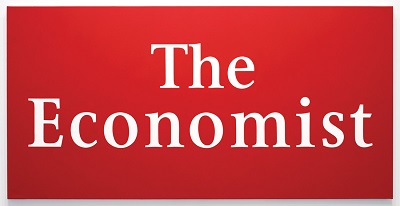2016 will see the rise of the organic tech industry, machines will monitor employee performance and the ‘zettabyte era’ will begin as the world will churn out more than a trillion gigabytes, according to new predictions from The Economist.
The Economist’s annual compilation of predictions for the year ahead, The World in 2016, is now available on newsstands and on The World in 2016 app from today.
In this year’s edition:
• Leaders of three of the world’s biggest emerging markets—China, India and Nigeria—outline their priorities for the coming year
• The head of the IMF identifies the actions needed for the world economy
• The CEO of Uber predicts that the sharing economy will transform the world of work for the better
• Malala Yousafzai, the world’s youngest Nobel peace-prize winner, argues for a focus on girls’ education
• The inventor of the world wide web, Tim Berners-Lee, points to the issues that will matter for the future of the digital revolution
The 30th edition also includes a special section, “Minds on the future”, which gathers together predictions from people who look at the future in different ways, ranging from novelist Margaret Atwood to trend-spotter Faith Popcorn and astrologer Mystic Medusa.
The World in 2016 includes predictions on the year ahead from Economist journalists and guest contributors. Leaders of three of the world’s biggest emerging markets—China, India and Nigeria—outline their priorities for the coming year; the head of the IMF identifies the actions needed for the world economy; the chief executive of Uber predicts that the sharing economy will transform the world of work for the better; the world’s youngest Nobel peace-prize winner argues for a focus on girls’ education; and the inventor of the world wide web points to the issues that will matter for the future of the digital revolution.
The 30th edition also includes a special section, “Minds on the future”, which gathers together predictions from people who look at the future in different ways, ranging from novelist Margaret Atwood to trend-spotter Faith Popcorn and astrologer Mystic Medusa.
Among the main guest contributors:
Narendra Modi, prime minister of India, expects India’s growth in 2016 to be the highest among major economies.
Li Keqiang, prime minister of China, summarises China’s priorities for 2016 as structural reform to favour entrepreneurship, greater openness and international industrial co-operation.
Muhammadu Buhari, president of Nigeria, stresses a determination to bring about a complete break with the cycle of gross corruption that has damaged Nigeria’s reputation among investors.
Christine Lagarde, managing director of the IMF, calls for 2016 to be a year of urgent action—from structural reform to investment in infrastructure—to boost economic growth.
Travis Kalanick, CEO of Uber, argues that sharing-economy firms will give people more power over when, where and how long they work
Malala Yousafzai, Nobel peace-prize winner, wants to see specific commitments in 2016 from countries around the world to provide secondary education for the most vulnerable girls.
Roger Goodell, NFL commissioner, looks beyond 2016’s Super Bowl 50 to a future for American football beyond that could include teams based outside the United States and regular-season games in Mexico.
Tim Berners-Lee, inventor of the world wide web, stresses data’s role (not least, public datasets) in the future of the web, and predicts that 2016 will bring a new international Open Data Charter.
Other predictions for 2016 include:
The open, global world under threat – If market-friendly internationalism is to prosper, small-bore policies won’t do, argues The Economist’s editor-in-chief, Zanny Minton Beddoes in her leading article: “In 2016 it’s time for radicalism at the centre.”
BRICS in a sorry state – as emerging markets struggle, rich countries will account for their largest share of global growth in this decade.
It’s the economy, stupid – If global forces derail America’s recovery, Democrats will lose the White House. If the economy keeps chugging along, Hillary Clinton can eke out a narrow win.
Migrants on the move – rivers of humanity will keep flowing towards Europe from the Middle East, Africa and beyond. This will strengthen the hand of anti-immigrant forces in Europe.
“Fintech” on the rise – $1 billion companies will start to seem like old hat in 2016 for the finance industry’s rising tech stars; the $10 billion club will have a growing membership.
The zettabyte era begins – in terms of the amount of data transmitted, in 2016 the world will churn out more than a trillion gigabytes, and move from the exabyte era to the zettabyte one.
Farewell to performance reviews – much of the stuff that line managers do will be dumped and replaced by monitoring by machines.
The year of the organoid – 2016 will bring the blossoming of a technology that lets scientists grow things resembling body parts in glass vessels, and use them for testing drugs.
Women at the heart of the big decisions – Investors will be watching for rate rises at Janet Yellen’s Fed, Hillary Clinton will be the candidate to beat for US president, Chancellor Angela Merkel will lead Europe’s response to migrants and British demands for a new deal on the EU.
Gold at the Rio Olympics – winners at the games will include Eduardo Paes, the city’s mayor, and quite probably Justin Gatlin, edging out Usain Bolt in the sprint.
“The year can be summed up in three words,” says Daniel Franklin, editor of The World in 2016, “woes, women and wins” – given the migrant troubles ahead, the fact that women will at the heart of many of the big decisions next year, and prominence of the Olympics and other big sporting events.
The World in 2016 features forecasts for 81 countries and 14 industries, a report card on what The Economist got right and wrong in 2015 and a calendar of events around the world in 2016.
Keep up with predictions on 2016 with @econworldin Twitter handle .
iframes are not supported by your browser.
